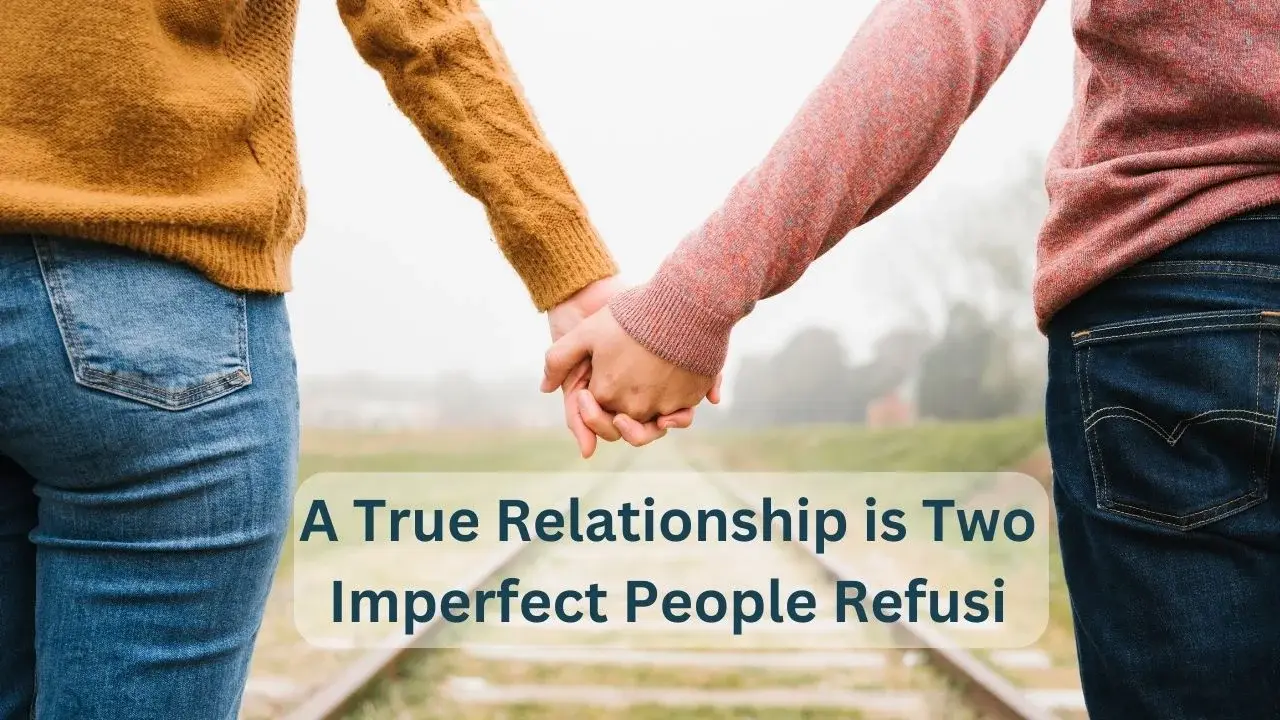A True Relationship is Two Imperfect People Refusing to Give Up
Relationships are often romanticized as perfect unions of flawless individuals who effortlessly understand and complete each other. However, in reality, a true relationship is a journey of two imperfect people who choose to stay together despite their flaws and challenges. This refusal to give up, even when the going gets tough, is what makes a relationship truly strong and enduring.
The Beauty of Imperfection in Relationships
What Does It Mean to Be Imperfect?
To be imperfect means to be human. We all have our flaws, quirks, and shortcomings. Whether it’s a bad habit, a fear, or an insecurity, these imperfections make us who we are. In the context of a relationship, imperfections can be seen as the unique characteristics that differentiate one person from another. They are the very elements that make a relationship rich and dynamic, providing opportunities for growth and understanding.
Why Embrace Imperfections in a Relationship?
Embracing imperfections in a relationship means accepting that neither you nor your partner is perfect. This acceptance fosters a deeper connection because it allows both partners to be their authentic selves without the pressure to conform to unrealistic expectations. It also creates a safe space where vulnerability is welcomed, and personal growth is encouraged.
The Power of Refusal to Give Up
Commitment Beyond Perfection
The refusal to give up is the cornerstone of any successful relationship. It’s easy to love someone when everything is going smoothly, but true commitment shines through during difficult times. When two people are dedicated to making their relationship work, despite the challenges they face, they build a bond that is resilient and enduring.
The Role of Patience and Understanding
Patience and understanding are crucial in navigating the imperfections of a relationship. Recognizing that growth and change take time allows partners to support each other through their individual journeys. This patience fosters an environment where both individuals can evolve together, strengthening their bond.
The Role of Communication in Imperfect Relationships
Open Dialogue as a Tool for Growth
Communication is the lifeline of any relationship, especially in the face of imperfections. Open dialogue allows partners to express their thoughts, feelings, and concerns without fear of judgment. This transparency promotes mutual understanding and provides a platform for resolving conflicts constructively.
Active Listening: Understanding Your Partner’s Imperfections
Active listening is essential in understanding your partner’s imperfections. By truly listening to each other, partners can better comprehend the underlying reasons for certain behaviors or insecurities. This understanding fosters empathy and helps in addressing issues with compassion rather than criticism.
Embracing Vulnerability in a Relationship
Why Vulnerability is Key to True Connection
Vulnerability is often seen as a weakness, but in relationships, it is a strength. Being vulnerable means allowing your partner to see your true self, including your flaws and insecurities. This openness creates a deeper emotional connection, as both partners feel safe to be themselves without fear of rejection.
How to Be Vulnerable Without Fear
Being vulnerable requires trust. To embrace vulnerability without fear, it’s essential to create a supportive environment where both partners feel secure in sharing their innermost thoughts and feelings. Encouraging each other to be open and honest, even about difficult topics, strengthens the relationship and builds a solid foundation of trust.
Overcoming Challenges Together
Facing Life’s Trials as a Team
Every relationship faces challenges, whether they are financial difficulties, health issues, or personal conflicts. The key to overcoming these challenges is to approach them as a team. By working together, couples can find solutions that benefit both partners, reinforcing their bond and commitment to each other.
Strategies for Navigating Conflict
Conflict is inevitable in any relationship, but it’s how couples handle these conflicts that determine the strength of their relationship. Effective strategies for navigating conflict include open communication, active listening, and a willingness to compromise. By addressing issues head-on and finding common ground, couples can resolve disputes in a way that strengthens their relationship.
The Role of Forgiveness in a Lasting Relationship
The Importance of Letting Go of Grudges
Holding onto grudges can poison a relationship. Forgiveness is essential for moving past mistakes and misunderstandings. By letting go of resentment, couples can heal and grow stronger together, rather than allowing negative feelings to fester and create distance between them.
How to Forgive and Move Forward Together
Forgiveness is a process that requires empathy, understanding, and a genuine desire to move forward. Couples can practice forgiveness by focusing on the positives in their relationship, acknowledging each other’s efforts to improve, and committing to learning from past mistakes rather than dwelling on them.
Building a Relationship on Trust and Mutual Respect
Why Trust is the Foundation of a Strong Relationship
Trust is the bedrock of any healthy relationship. Without trust, doubts and insecurities can erode the connection between partners. Trust is built through consistent actions, open communication, and a commitment to honesty. When trust is present, both partners feel secure in the relationship, allowing love to flourish.
Ways to Cultivate and Maintain Trust
Cultivating and maintaining trust requires effort from both partners. This can be achieved by being reliable, keeping promises, and being transparent in communication. Regularly checking in with each other, expressing appreciation, and addressing concerns promptly also help to reinforce trust and keep the relationship strong.
The Influence of Time on Relationships
Growing Together Over Time
Time plays a significant role in the evolution of a relationship. As couples spend more time together, they learn more about each other’s strengths and weaknesses. This shared history creates a deep bond, as both partners have weathered life’s ups and downs together. Growing together over time solidifies the relationship, making it more resilient to challenges.
The Evolution of Love in a Long-Term Relationship
Love evolves over time. What begins as passionate infatuation can deepen into a more profound, enduring love. This evolution is natural and reflects the maturity of the relationship. As partners grow together, their love becomes more about companionship, mutual respect, and shared experiences than just physical attraction.
Conclusion
A true relationship is not about perfection; it’s about two people who, despite their flaws and imperfections, choose to stay together and work through their challenges. This commitment to each other, grounded in trust, communication, and mutual respect, is what makes a relationship truly strong and enduring. By embracing imperfections and refusing to give up, couples can build a love that lasts a lifetime






